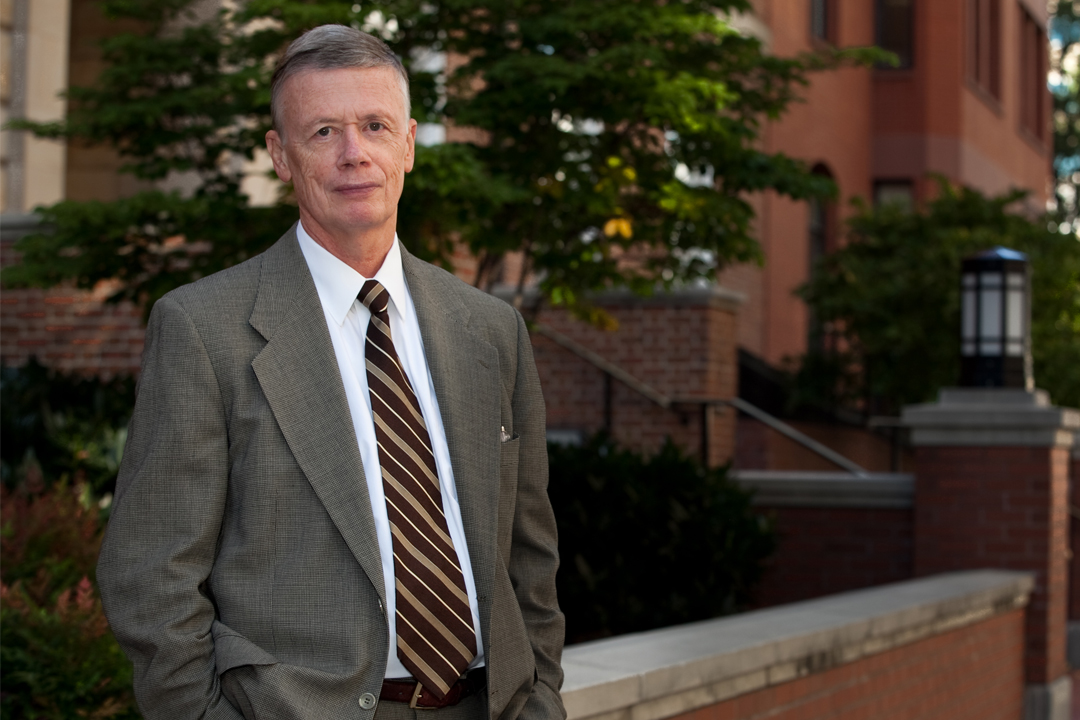At the 150th commencement of GW Law this past May, Dean Blake D. Morant conferred emeritus status to Peter Raven-Hansen, Glen Earl Weston Research Professor of Law Emeritus. Professor Raven-Hansen joined the faculty in 1980, along with Professors Roger E. Schechter and Mary M. Cheh, at a time when the law school had evolved from what had been largely a part-time program to a mainly full-time program with national aspirations.
In the ensuing decade under the leadership of Jerome A. Barron, Harold H. Greene Professor of Law Emeritus, Professor Raven-Hansen witnessed the changes such as the construction of the Lerner building, which transformed the classrooms, and the explosive growth of the full-time faculty, which together helped to make GW Law a national law school with a robust evening program. Professor Raven-Hansen said that during the succeeding leadership of Jack Friedenthal, Howrey Professor Emeritus of Trial Advocacy, Litigation, and Professional Responsibility, Dean Friedenthal not only cemented and raised that reputation, he also renovated multiple law school buildings. "I benefitted from these developments and was involved as well as an active faculty member, Chair of the Building Committee during the major renovations, and twice as Associate Dean for Academic Affairs," Professor Raven-Hansen said.
Professor Raven-Hansen explained that the highlight of his short stints as Associate Dean for Academic Affairs, was making new friends in the law school beyond the law school faculty. "A tenured faculty member can pretty much fly solo and doesn't really have to 'play well with others'—that is, practice people skills—as much as other professionals," he said. An administrator doesn't have that luxury (or flaw), Professor Raven-Hansen said. He therefore got to know administrators and staff members in a way "that largely escaped me as a faculty member." He worked with them and relied upon them daily to solve problems, such as dealing with student conduct, registration, and teaching assignments—to name a few. "I made plenty of mistakes, but really good people helped me through them and let me practice the people and management skills I had neglected. Most important, they became friends for whom I have been grateful ever since."
As for other fond but less serious memories, Professor Raven-Hansen shared that he would "shamelessly but unsuccessfully" crib teaching points from Professor Schechter. "He'd do it, and it worked perfectly. I'd try it and it fell flat." He soon realized that the difference was that "he was always the better teacher by far."
Asked about influential cases he has taught, Professor Raven-Hansen said that those that most impacted his classes were chiefly those he litigated in the last decade. He represents American victims of terrorist attacks in federal courts under the Anti-Terrorism Act. Professor Raven-Hansen explained that this litigation not only informed a chapter on "Suing Terrorists and Their Supporters" in the Counterterrorism Law casebook which he co-authors, it "somewhat unexpectedly colored" almost every class he taught in Civil Procedure. He said the litigation, which began in 2004 and continues to this day, provided examples for class about every phase of a civil suit, from selecting a court and filing a complaint to initiating an appeal. "These were more than war stories; they were teaching moments. I think they also let my students share my excitement about practicing law," he said. "For example, I recall being greeted with cheers in one Civil Procedure class after the New York Times reported that the jury had returned a liability verdict for the plaintiffs in one of the longest-running cases."
Asked about his career highlights, Professor Raven-Hansen noted that he helped to establish an academic field—National Security Law. He taught courses on national security, was co-author of the leading casebook (now in its sixth edition), and still practices in the field. Professor Raven-Hansen also is co-author of a casebook, Civil Procedure: A Coursebook, which takes a student-friendly approach that students have liked, "if 'like,'" he offered, "is ever the right word for the students' reaction to a casebook." He also shared that briefing and arguing motions and appeals in federal courts on behalf of American victims of terrorism has been rewarding: "Mainly because it's been in a good cause for the most deserving clients, but also because my work for them made my teaching better."
All that said, however, "the fondest moments for me as a teacher are always whenever a former student admits learning something in your class," Professor Raven-Hansen said.
In May, Dean Morant and faculty members celebrated Professor Raven-Hansen's career at a formal luncheon. His emeritus status was announced prior to the ceremony address at commencement. Professor Raven-Hansen spoke about that moment, saying, "Dean Morant is a wonderfully upbeat and infectiously warm individual, so I was delighted to have him announce the status at my final commencement ceremony and grateful for the faculty's and the graduates' generous response."
As for Professor Raven-Hansen's post-teaching plans, he said, "As I reminded my friends, I've only stopped teaching. I will keep representing victims of terrorism in federal courtrooms and maintaining my casebooks and civil procedure treatise. I plan to keep looking for ways to use my modest legal skills and experience for some time to come."


